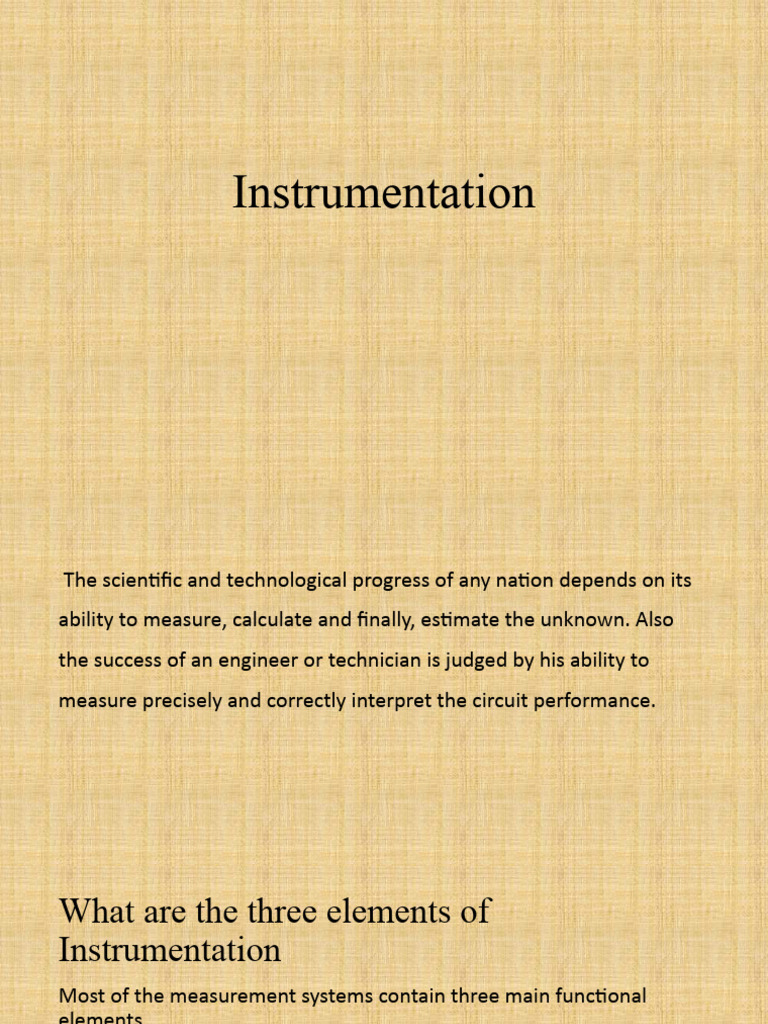Instrumentation, often relegated to the background of scientific and engineering discourses, represents a pivotal paradigm that interweaves technology and measurement in a synergy of exploration and understanding. The real purpose of instrumentation transcends mere functionality; it serves as a conduit for enhancing precision, enabling discovery, and expanding the horizons of knowledge across various disciplines. This article aims to illuminate the multifaceted roles of instrumentation, challenging the conventional perceptions and encouraging a more nuanced contemplation of its implications.
The first and perhaps most apparent purpose of instrumentation is to provide accurate measurements. In the realm of physics, chemistry, and engineering, the precision of data is paramount. Instruments function as tools that quantify variables such as temperature, pressure, and electrical resistance. Temperature sensors facilitate climate studies by offering precise readings that highlight trends in climate change, while pressure transducers allow engineers to design secure structures capable of withstanding natural forces. Each measurement is not merely a numerical value; it is an integral part of a larger narrative that informs decision-making processes, influences research trajectories, and drives technological advancements.
Beyond mere measurement, instrumentation catalyzes the generation of new knowledge. By employing sophisticated instruments, researchers can unearth phenomena that would remain obscured without these advanced capabilities. For instance, spectroscopic instrumentation permits the analysis of atomic and molecular structures, unveiling the complexities of material properties and behavior. Such discoveries can lead to breakthroughs in fields as varied as pharmacology and materials science. The ability to probe the minutiae of physical systems fosters an intrinsic curiosity about the foundational elements of our universe, propelling scientific inquiry into uncharted territories.
Moreover, instrumentation embodies a shift in methodological approaches to scientific exploration. Traditional experimentation often necessitates a direct interaction with the subject of study. However, modern instruments facilitate remote observation, allowing researchers to study phenomena that are too hazardous or impractical to investigate through conventional means. Satellite imaging, for example, offers critical insights into geographic and environmental phenomena from space, revolutionizing the fields of geography and ecology. This paradigm shift not only broadens the scope of scientific exploration but also redefines the boundaries of possible inquiry.
Instrumentation also enhances the reproducibility and reliability of experimental results. The foundational principles of the scientific method demand that experiments be repeatable and verifiable. Instruments equipped with advanced calibration systems ensure that measurements remain consistent over time and across various environments. This reliability is crucial in the realm of pharmaceuticals, where the efficacy and safety of new drugs hinge upon accurate measurement and reporting. Consequently, the capacity of instrumentation to uphold rigorous standards of measurement underlines its role as a cornerstone of scientific integrity.
As the landscape of instrumentation evolves, the integration of artificial intelligence (AI) and machine learning into measurement systems represents a significant frontier in both capability and understanding. These technologies enable the processing of vast datasets generated by modern instruments, facilitating the extraction of meaningful insights through advanced analytical techniques. In this respect, instrumentation transforms from mere measurement tools into intelligent systems that can anticipate patterns, optimize processes, and generate predictive models. This convergence of technology not only augments human capability but also invites a re-evaluation of our relationship with the instruments themselves—are they simply tools, or have they become co-collaborators in scientific discovery?
In addition to advancing science, instrumentation has profound societal implications. Precision in measurement influences public health, safety, and infrastructure. Environmental monitoring instruments, such as air quality sensors, inform policies and practices aimed at safeguarding public health and enhancing air quality standards. Similarly, in urban settings, instrumentation helps city planners design smart infrastructure that optimizes resource usage and improves the quality of life for inhabitants. Hence, the societal impacts of instrumentation extend far beyond laboratory confines; they resonate through communities, shaping avenues for sustainable development and informed policy-making.
Furthermore, a redefinition of the educational landscape is imperative in light of the growing importance of instrumentation. As the field advances, educational institutions must adapt curricula to encompass emerging technologies and emphasize both theoretical foundations and practical applications. Integrating hands-on experiences with sophisticated instrumentation allows students to cultivate a deeper understanding of the principles at play and the technologies shaping their disciplines. An informed, instrumentally literate populace is imperative for fostering innovation and maintaining a competitive edge in an increasingly data-driven society.
Ultimately, the real purpose of instrumentation goes beyond the quantification of the physical world; it embodies a commitment to discovering the underlying mechanisms that govern natural phenomena. This commitment compels researchers and practitioners alike to engage in a continuous quest for knowledge, urging them to question established norms and venture into the unexplored. Through instrumentation, the intersection of technology, measurement, and human curiosity becomes a vibrant arena for growth, urging us to envision and embrace the future.
In conclusion, as we forge ahead into a world where instrumentation plays an ever-expanding role, it is crucial to acknowledge its significance in shaping the scientific landscape. By reimagining the purpose of instrumentation as a multifaceted tool for exploration, innovation, and societal advancement, we can better appreciate its pivotal role in influencing our understanding of the universe and our place within it. The promise of instrumentation, therefore, lies not only in the accuracy of its measurements but in its potential to transform perspectives, ignite curiosity, and ultimately pave the way for future discoveries.










